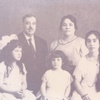Disclaimer
This entry contains information known to us from a variety of sources but may not include all the information currently available. Please be in touch if you notice any inadvertent mistakes in our presentation or have additional knowledge or sources to share. Thank you.
Archive
Moses Somake: Edward House at Karachi, Pakistan
In the 1920s and 30s, the Edward House was the place to be in Karachi. More specifically, the Café Grand, located on the ground floor of the immense building constructed by Iraqi Jewish architect Moses Somake. Run by confectioner Herbert Cumper, Café Grand was a ritzy, jazzy venue known for its delectable menu and frequented by Karachi’s most famous artists and writers.1 The café closed decades ago, and these days the building now houses offices, shops, and a few residential blocks. Until 2000, one of Café Grand’s signs remained on the building, a last reminder of former glories.2
Description
Moses Somake Although Moses Somake’s buildings are among the most famous and recognizable in Karachi, little is known about the architect who designed them. Somake was born on June 6, 1875, possibly in Lahore. Sources describe him as an Iraqi Jew, but differ as to whether he was born in Iraq or was of Iraqi heritage but born in India. He spent most of his life in Karachi before emigrating to England in the mid 1940s, and died on April 6, 1947.3 During his years in Karachi he designed over a dozen buildings, including mansions, hotels, and a mosque that was never built.4 Many of the buildings still remain: some, including the Karachi Goan Association Hall and the BVS Parsi School, still fulfill their original purpose, while others are neglected or have fallen into disuse. Even the buildings that are virtually abandoned are still recognized as some of Karachi’s most beautiful and striking landmarks, emblematic of a style described as “hauntingly beautiful”.5 Somake’s buildings preserve the past through their uses as well as their designs, recalling the greater religious diversity that existed in Karachi in the early 20th century, when a Jewish architect could be commissioned to design a mosque, a building for a predominantly Christian club, and a school for Zoroastrian students.
History The Edward House dates from 1910.6 It was built by Moses Somake, and while it lacks the flair of some of his other Karachi buildings, its simple façade and detailed balustrades give it an elegant appearance. Somake may also have designed the adjacent Victoria Mansion; there are no records of him working on it, but it shares many stylistic similarities with the Edward House.7 While the building is known for being the location of the Café Grand, today it is occupied by shops, offices, and apartments. Time has not been kind to the Edward House—pollution has dirtied the stonework and eaten away its patina. The building was cleaned and renovated in 2011, but the project was dogged by controversy. A senior architect on the restoration project accused the renovators of chiseling the original stone and erasing the remaining patina, further damaging the building they were trying to preserve.8
Karachi's Jewish Community In the early 19th century, Jews of the Bene Israel communities in India migrated to Indian costal towns, including Karachi. By the 1890s, Karachi had a thriving Jewish population; the city’s Magan Shalome synagogue was constructed in 1893.9 The Jewish community played a role in shaping Karachi’s development—whether through the physical development of the city, as architect Moses Somake’s buildings transformed the landscape, but or through political influence. Two prominent members of the Jewish community in the early 20th century were heavily involved in Karachi’s government. Solomon David Omerdekar, who spearheaded the effort to construct the synagogue, held several positions in the local government, and a street named after him still exists to this day.10 Abraham Reuben served as the first Jewish city councilor, elected to the city council three times between 1919 and 1939.11 According to several accounts, Karachi in the early 20th century was a very tolerant city, with diverse religious populations coexisting peacefully.12 While the Jewish population was around 2500 at the time of partition, mass emigrations to Israel in the 1950s reduced the population to less than 300 by 1968.
Sources
[1] Salman, Mohammed. “House in (dis)order.” Dawn.com. October 4, 2009. Accessed July 9, 2014. http://www.dawn.com/news/918020/house-in-dis-order
[2] Ibid.
[3] Salman, Mohammed. “Somake’s Karachi.” Dawn.com. May 22, 2011. Accessed July 8, 2014. http://www.dawn.com/news/630841/somakes-karachi
[4] Maher, Mahim. “The Jews built Karachi, but we built shopping plazas on their synagogue.” The Express Tribune. November 3, 2013. Accessed July 8, 2014. http://tribune.com.pk/story/626468/secret-histories-the-jews-built-karachi-but-we-built-shopping-plazas-on-their-synagogue/
[5] Salman. "Somake's Karachi."
[6] Salman. “House in (dis)order.”
[7] “City Landmarks – Edward House and Victoria Mansion.” The Karachi Walla. September 23, 2011. Accessed July 9, 2014. http://thekarachiwalla.com/2011/09/23/city-landmark-edward-house-and-victoria-mansion/
[8] Husain, Shahid. “Flawed renovation threatens historic Edward House.” The News. October 19, 2011. Accessed July 9, 2014. http://www.thenews.com.pk/Todays-News-4-73169-Flawed-renovation-threatens-historic-Edward-House
[9] Ghosh, Palash. “Karachi Yahudi: Pakistan’s vanishing (or vanished) Jewish community.” International Business Times. November 16, 2013. Accessed July 9, 2014. http://www.ibtimes.com/karachi-yahudi-pakistans-vanishing-or-vanished-jewish-community-1472832
[10] Ibid.
[11] Ibid.
[11] Ibid.










